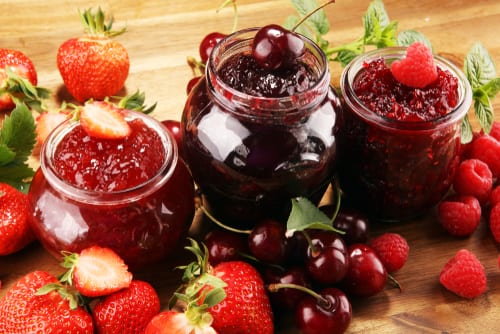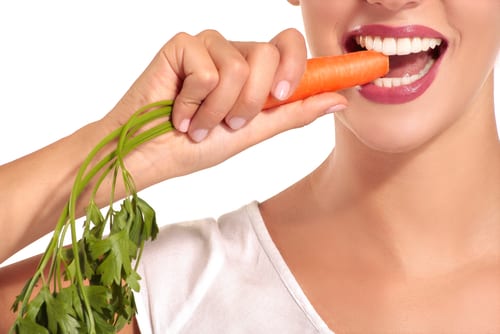Posted August 09, 2019 in Dental/Oral Health
You wake up in the morning, feeling groggy and sluggish, and make your way into the kitchen to pour your morning cup of coffee.
Then you head back to the closet to throw on some clothes and get the day started.
After you finish getting ready, you’re running a few minutes late, so on your way out you grab an orange for breakfast and hop into your car to get started on your commute, sipping happily on your mocha-caramel-cream coffee as you head down the highway.

Despite having a late start, you manage to get to work on time and, before you know it, a busy day brings about lunchtime.
Since you didn’t have time to pack up those leftovers from last night, you grab the emergency bag of cheap, white bread and a couple of jars filled with peanut butter and jelly for lunch.
You don’t feel quite satiated, so you decide to grab a bag of potato chips from the breakroom to hold you over until dinner.
You finish the day off and hop back into your car before heading into the local gas station to fill up. It’s your lucky day, 64-ounce drinks are on sale for 98 cents.
You fill the gargantuan cup with your favorite fizzy treat and continue the ride home, throwing the empty styrofoam into your garbage can on the way into the house.
After dinner, you have a few friends over and share a few drinks. You haven’t seen them in a while, so you decide to pour a few glasses of an aged whiskey. Another friend shows up and brings a bottle of wine.

While this might seem like just another average day, each dietary decision that was made will have significant negative impacts on the health of your dental health, particularly in your gums.
Bleeding, inflammation, and tenderness are all symptoms that any dentist would expect you to experience after falling into this kind of dietary routine.
Which Foods Were Bad for My Teeth?
In short, all of the foods that were consumed had a significant impact on the health of your teeth and gums.
Sugary (and even starchy) foods can hide in the small cracks between your teeth and cause decay, inflammation, and tenderness, while sharp, crunchy foods can create small tears in the mouth and gums, causing bleeding in the gums and infection.
Coffee
The first substance that was consumed in the morning was possibly the worst one of the day. Caffeinated drinks dry out the mouth, which prevents saliva from breaking down the particles of food and drinks that get left behind. Dumping mounds of sugary additives into the coffee is the best way to ensure that you develop cavities in the small nooks between the teeth that only sugar particles can get to. Also, if you weren’t already aware, coffee stains teeth.
Oranges and Other Citrus
A natural fruit couldn’t possibly be unhealthy, could it? While fine in moderation, excessive amounts of citrus (oranges, mandarins, lemons, limes, etc.) can strip away the enamel on your teeth and expedite the development of cavities. Remove enough of a tooth’s enamel and you will likely experience problems like chipped or cracked teeth.

It is worth noting, however, that oranges and other citrus are high in vitamin C, which can help prevent or minimize bleeding of the gums, so it is important to find a balance when consuming these foods.
Breads
If asked what the worst foods for your teeth were, most people wouldn’t consider bread to be on the top of the list. But it is actually just as bad as candy when it begins to break down in your mouth. Your saliva deconstructs the starches in your bread to create sugar. This means that while you chew on the bread any small particles that break away immediately start to fill the crevices of your teeth, causing problems like gingivitis and tartar buildup. If these conditions get bad enough, a complete tooth extraction could eventually be required.
Chips and Other Crunchy, Sharp Foods
Anything that crunches poses a potential risk to your dental health, particularly your gums. Chips and other crunchy treats can penetrate the lining of your gums, causing bleeding and opening you up to oral infections.
If you develop a bad enough infection, it is possible you will need a root canal to repair the damage.
Jellies and Sticky Foods
You gave yourself a double-whammy when you decided to fill those bread slices with sugary jam.
Sticky foods like jelly—and even dried fruit—stick to the teeth much longer than other foods, eating away at the enamel and opening you up to cavities and, in the worst cases, operations like root canals.
 Sodas and Other Sugary Drinks
Sodas and Other Sugary Drinks
You’ve probably noticed a trend: sugar is not good for your teeth.
If this is true (and it is), then sodas (and in most cases, sports drinks) are by far the worst culprit for causing everything from gingivitis to yellow teeth.
A typical can of soda has around 40 grams of sugar. If you are drinking out of a glass, can, or bottle, all of the sugar is rushing right past your pearly whites, slowly deteriorating the integrity of your teeth.
In the worst-case scenario, excessive tartar builds up from sugars and other foods, leading to periodontal disease, which exposes your mouth to bacterial infections that can destroy the gums, teeth, and underlying bone structure.
Wine and Other Alcohols
Similarly to coffee, alcohol is highly effective at drying out the saliva in your mouth. Saliva is the body’s front line against early signs of tooth decay and gum disease. If you are drinking something deep in color, like red wine, you are also subjecting yourself to tooth discoloration.
What Foods Are Good for My Teeth?
There are plenty of foods that you can use to maintain healthy teeth and gums:
Leafy Vegetables
Eating foods like spinach and lettuce that are high in fiber is a great way to ensure healthy teeth and gums because they require a lot of chewing, which both stimulates the production of saliva and scrubs down the surfaces inside your mouth to remove tartar and plaque deposits.

Sugarless Gum
Sugarless gum benefits your dental health in the same way that leafy vegetables do: by promoting saliva production and removing plaque buildup. The key to this, however, is to make sure you are buying chewing gum that is sugar free; otherwise, you are just adding substances to your mouth that will create problems rather than remedy them.
Dairy
Calcium is one of the main minerals that is linked to bone health. While the teeth are not technically considered bones, they behave very similarly in terms of growth.
Dairy that contains healthy bacteria, known as probiotics, is even more beneficial because the healthy bacteria fills all the empty spaces in the mouth, preventing bad bacteria from sticking.
Celery and Carrots
Vitamin A and C play a key role in keeping your gums healthy. While celery is packed full of both of those vitamins, carrots are a great source of vitamin A.
Both of these vegetables have the added benefit of being fibrous which, as we know from leafy vegetables, help remove and prevent the buildup of plaque and tartar.

Creating better dietary habits for your teeth and gums is as easy as swapping out a bag of chips for baby carrots or that large sugary drink for water.
Any step you take, no matter how small, will reduce the adverse effects that your current diet has on your dental health.
Have More Questions?
If you are experiencing tenderness, inflammation, or bleeding in your gums, it is possible that you have developed a dental condition due to a poor diet. If this is the case, or if you would like to get more information on how to better your dietary habits to prevent dental problems, then give us a call at 575-524-3722 or schedule a consultation here.